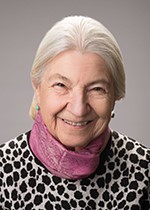Personalized Model of Kinematic and Dynamic of Physical Activities

Speaker: Prof. Ruzena Bajcsy
Affiliation: UC Berkeley
Abstract: By now, it has become a cliché the statement that the population in industrial world is aging and hence the problem of physical agility is a serious health problem. Moreover, this issue is aggravated even with younger population due to our sedative life style. It also is an undeniable (perhaps even too obvious) fact that every human’s anatomy and physiology is different. In recognition of this fact, we are focusing in our efforts in development of personalized models of kinematic and dynamics of an individual during physical activities, using System Identification methodology.
The above-mentioned kinematic and dynamical models are facilitated by two recent developments:
- Availability of various relatively inexpensive/affordable and noninvasive devices that can deliver the necessary parameters of the position, velocity, acceleration, masses of not only the body but individual limbs, forces generated during various physical activities. These devices are not only the standard cameras, motion capture, force plates and force sensors, inertial measuring devices, but also hand-held ultrasound cameras, Electromyography, Acoustic Myography, real time MRI infrared sensors measuring oxygen in the blood. More advanced sensors are rapidly developing.
- Mathematical and computational tools coming mainly from the field of robotics, control theory and optimization theory that afford to reliably process all the measurements, interpret them so that they generate the individual kinematic and dynamic predictive models of the physical performance of the individual. These models predict not only the physical performance of the individual but also delineate the weaknesses of the individual.
Our approach is to measure/estimate the kinematic/dynamic parameters, then model, and based on the performance we design interventions, i.e., assistive devices to help the individual better function in daily activities. In this presentation, we will show how we use measurement of the kinematic and dynamic parameters of the individual; we will be testing the validity of our approach/our predictive performance on both healthy subjects here at UC Berkeley and UC San Francisco Medical School. Our experimental paradigm is anchored in sit-to-stand exercise.
Biography: Ruzena Bajcsy received the Master’s and Ph.D. degrees in electrical engineering from Slovak Technical University, Bratislava, Slovak Republic, in 1957 and 1967, respectively, and the Ph.D. in computer science from Stanford University in 1972. In 2001, she accepted the position to become the founding director of the Center for Information Technology Research in the Interest of Science (CITRIS) and Professorship of Electrical Engineering and Computer Sciences at the University of California, Berkeley. Prior to joining Berkeley, she headed the Computer and Information Science and Engineering Directorate at the National Science Foundation between 1999 and 2001. Dr. Bajcsy is a member of the National Academy of Engineering and the National Academy of Science Institute of Medicine. She is recipient of numerous awards from ACM, IEEE , NAE, and most recently form the City of Philadelphia, the John Scott Award.
For more information, contact Prof. Ankur Mehta (mehtank@ucla.edu)
Date/Time:
Date(s) - Mar 05, 2018
12:30 pm - 1:30 pm
Location:
Mong Learning Center – EE-VI – #180
404 Westwood Plaza , Los Angeles California 90095
